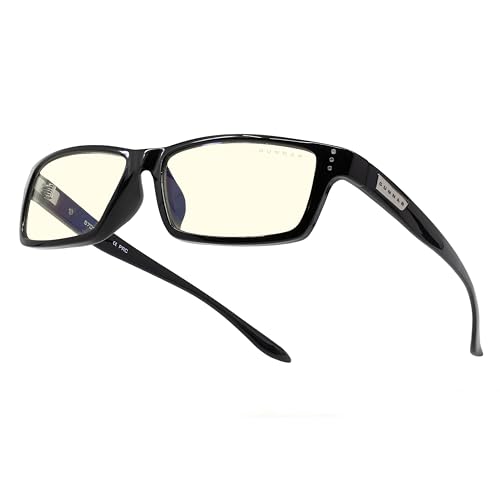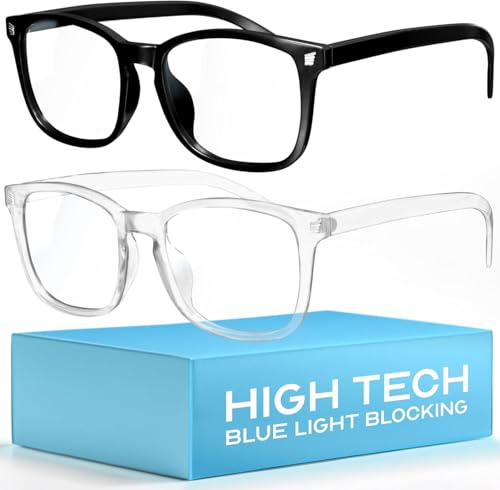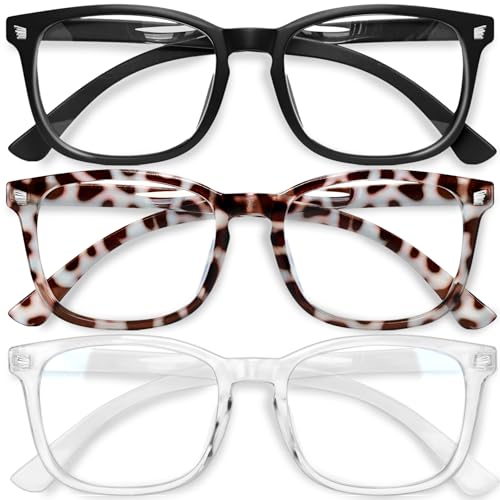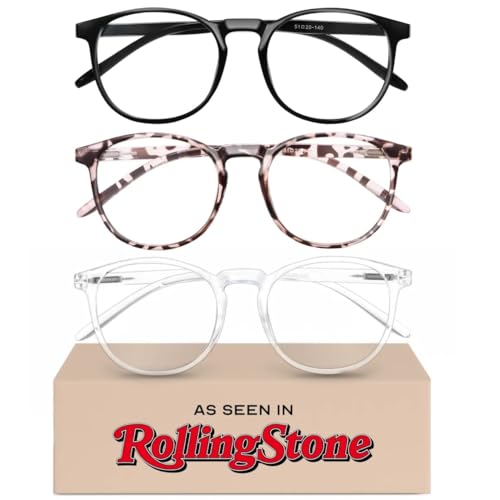Are computer glasses worth the hype, you’ve been wondering? To put it bluntly, yes, they sure do work. Contrary to any skepticism, these specialized eyewear aren’t a mere marketing gimmick. Instead, they serve a genuine purpose in the digital age. How do they work, you ask? Computer glasses are designed to help reduce the strain on your eyes caused by long hours of screen time. Prolonged exposure to screens can lead to blurred vision, dry and irritated eyes, headaches, and even trouble sleeping. In essence, computer glasses mitigate these effects.
Since screens are now an integral part of your daily routine – from work to entertainment – it’s natural to worry about your eye health. Enter computer glasses, the knight in shining armor, specifically designed to combat eyestrain and other visual symptoms generated by extended screen exposure. They essentially filter out the light emitted by digital screens, reducing the stress on your eyes.
The magic lies in the lenses. These glasses have lenses typically enhanced with a form of anti-reflective coating. The coating minimizes the amount of light bouncing off the front and back of the lenses, reducing glare, enhancing clarity, and promoting healthier, relaxed eyes. To sum up, computer glasses quite literally help your eyes work better and feel better while you manage your digital life.
Understanding Computer Glasses
Understanding the design and purpose of computer glasses is the first step to fully grasping how they work. So, what are computer glasses? They’re specialized eyewear designed to reduce eye strain, a common symptom of prolonged screen usage. Digital screens emit blue light that can lead to discomfort if you’re exposed to it for long hours. That’s where computer glasses come in.

Computer glasses have lenses that are designed with a specific purpose: to block or filter out the blue light emitted by digital screens. They may also have anti-reflective coatings or tinted lenses, depending on the brand and model. The primary goal is to reduce glare and filter out the harsh light that can contribute towards digital eye strain.
Use cases can depend on your needs. Here’s a bullet point list to give you an idea:
- Regular computer users: If you’re spending several hours a day on a computer for work or personal use, computer glasses could be beneficial.
- Hardcore gamers: Gamers who spend long sessions in front of a screen could benefit from reduced eye strain.
- Digital professionals: If you’re a graphic designer, video editor, or any professional who needs accurate color representation on your screen, some computer glasses are specially designed not to distort color spectrums.
It’s also essential to understand that computer glasses are not a one-size-fits-all solution. The effectiveness can vary from person to person, based on factors like personal comfort, the amount of time spent in front of a screen, and even individual sensitivity to blue light.
Always remember, when choosing computer glasses, It’s important to consider the lens technology, frame design, and overall comfort. These factors can greatly affect how beneficial the glasses will be for you. No two pairs of computer glasses are the same so making an informed choice based on your specific needs and usage habits is crucial for obtaining the intended benefits.
The Science behind Computer Glasses
Wondering how computer glasses work? They rely on a principle called eye accommodation. Our eyes, like a camera lens, can adjust focus on different distances. Overuse or aging can strain this focus adjustment, leading to eye fatigue or blurred vision, sometimes dubbed ‘computer vision syndrome.’
Computer glasses tweak your vision subtly. They are designed to optimize your sight for a specific distance – the typical distance from your eyes to a computer screen. Here’s the breakdown:
- They generally have a slight magnification just enough to reduce eye strain but not blur your vision.
- Many have a yellow-tint to block blue light, helping your eyes feel less tired.
- Some have layers that reduce glare, keeping reflective disturbances at bay.
Let’s not forget that every monitor emits blue light. This light, with shorter wavelengths and more energy, has been linked to eyesight deterioration and sleep disruption. Researchers call this ‘digital eyestrain.’ Computer glasses often are designed to reduce blue light exposure, offering your eyes a protective layer against these potentially harmful effects.
To illustrate the possible repercussions, consider this markdown table representing data related to digital eyestrain:
| Cause | Physical Outcome |
|---|---|
| Blue light exposure | Eye discomfort, sleep disruption |
| Computer glare | Eyestrain, blurred vision |
Now, you might think, “I could just adjust my monitor settings or work in a lower light environment.” That’s an option, though it’s not always practical or effective. Computer glasses aim to tackle the root cause by modifying the light before it reaches your eyes.
To sum it up, computer glasses work by combining a bit of magnification, blocking blue light, and reducing glare to optimize your vision for computer use, and thus lessen any eye strain you might experience. Remember though, if you’re experiencing persistent eye discomfort despite using computer glasses, it’s best to consult an eye care professional.
How Do Computer Glasses Work?
When you’re staring at a computer screen for hours on end, computer glasses can be your eyes’ best friends. But how do they function exactly?
Coming into play is an innovative technological concept: anti-reflective coating. This coating reduces glare that bounces off screens and light sources. It’s a small change that packs a powerful punch for your visual comfort.
Mostly, computer glasses use yellow-tinted lenses. This tinting helps increase contrast on your screen and tone down harsh blue light. They’ll typically block out between 25% and 90% of blue light, depending on the brand and level of protection.
Blue Light Blocking percentage by different computer glasses brands
Brands Percentage of Blue Light Blocked Brand A 90% Brand B 75% Brand C 50% Brand D 25%
Blue light itself, found in natural sunlight and emitted by digital screens, isn’t innately bad. In fact, during daylight hours it can boost mood and alertness. The issue arises when you have too much of it, especially in the evening. That’s where the benefits of computer glasses really shine. They’re designed to protect your eyes from overexposure to blue light.
Another tool in their box is magnification. Many computer glasses contain a slight magnification to ease the strain on your eyes. By essentially turning your eyeglasses into mini reading glasses, objects and text on your screen appear larger and clearer, causing less strain on your eyes as they don’t have to work as hard.
The effectiveness of computer glasses ultimately boils down to how they are used. They’re most beneficial when used in combination with healthy digital habits, such as limiting screen time, blinking often and taking regular breaks.
As you navigate this digital age, take note of how much your eyes can benefit from computer glasses. They’re a worthy ally in the battle against blue light and the discomfort that screens can bring. So remember, it’s not just about wearing them – it’s about using them wisely!
Are Computer Glasses Relevant to You?
Checking your email, scrolling through news, joining Zoom meetings – it’s safe to say technology has become integral in almost every aspect of our lives. But what’s the cost of this digital reliance for you? It’s vital to consider the impact of increased screen time, including the potential for digital eye strain. In comes the solution: computer glasses. But you’re likely wondering, are these specially designed lenses truly beneficial?
Computer glasses are designed to reduce the harm dealt by extended periods in front of digital screens. This is achieved through specially crafted lenses meant to alleviate potential eye strain, blurred vision, and disruptive sleep patterns. Here’s why you might want to consider getting a pair for yourself:
- You frequently use digital devices such as smartphones, laptop or desktop computers, and tablets.
- By late afternoon, you regularly feel a strain in your eyes or suffer from headaches.
- You experience blurred vision or difficulty focusing after a long day in front of screens.
- You have trouble sleeping after spending the evening scrolling on your phone or watching TV.
On the other hand, if you don’t fall into any of these categories, the need for computer glasses might not be as pressing for you.
However, with the current digital age we live in, almost everyone can benefit from wearing computer glasses, even if they don’t immediately recognize the symptoms of digital eye strain. At this point, you’re probably wondering about the effectiveness of these glasses.
Computer glasses have been proven to work by various studies. For example, a study in the Journal of the American Optometric Association found that Computer Vision Syndrome (CVS) affected 64% to 90% of office workers. This statistic drastically decreased when the workers wore computer glasses. Clear evidence of their effectiveness.
| Study | Without Glasses | With Computer Glasses |
| ------------- |:-------------:| -----:|
| American Optometric Association | 64% - 90% CVS | Drastic reduction in CVS |
In conclusion, investing in a pair of computer glasses could very well be a wise move, particularly if you are a frequent user of digital devices. They offer tangible benefits with evidence to back them up. So, are you ready to protect your eyes in the digital age?
Impact of Computer Glasses on Eye Strain
You’re likely spending countless hours in front of digital screens, and you might have experienced some form of digital eye strain. Can computer glasses really relieve this stress on your eyes? Let’s dive in.
Computer glasses, specifically designed to reduce eye strain, have become increasingly popular. These glasses are equipped with anti-reflective lenses that minimize glare off screens. They’re supposed to enhance viewing contrast and lessen the overall stress on your eyes.
According to the Vision Council, nearly 60% of adults report symptoms of digital eye strain. This can manifest as dry eyes, headaches, blurred vision, or even neck and shoulder pain. Computer glasses aim to address these issues and have shown promising results in reducing these symptoms.
Here’s how computer glasses impact your eye strain:
- Filtered Light: These glasses are embedded with a blue light filter that reduces the amount of blue light exposure. Studies have shown that overexposure to this light, especially before bedtime, can disrupt sleep patterns. With less blue light entering your eyes, it’s more comfortable for you to work on digital devices.
- Increased Contrast: Computer glasses enhance the contrast on your screen, making it easier to read and process information. This ultimately reduces the strain on your eyes and your potential for fatigue.
- Reduced Glare: The anti-reflective coating in these glasses reduces glare off screens. This means less squinting and stress on your eyes.
However, computer glasses aren’t a cure-all. While they can provide relief from eye strain, they’re not substitutes for good screen habits. It’s vital to practice the 20-20-20 rule. For every 20 minutes spent looking at a screen, look at something 20 feet away for 20 seconds.
Also, regular eye exams are crucial for maintaining healthy vision in the era of screens. In fact, they’re more important than ever. So, if you’re experiencing any discomfort or changes in your vision, ensure to reach out to your eye care professional.
The Controversy: Skeptics’ Views on Computer Glasses
Despite the rising popularity, not everyone’s sold on the efficacy of computer glasses. Skeptics might argue that these specialized eyewear are nothing more than a clever marketing tactic. They say that instead of investing in these glasses, you’re better off following proven ways to reduce digital eye strain. So, let’s delve into the skeptics’ perspectives.
Skeptics argue that many brands fail to back their claims with solid scientific evidence. Some point out that most studies supporting blue light filtering glasses are often funded or conducted by the companies selling them. They contend there’s a clear bias and potential for manipulation of results.
Critics also suggest that the alleged benefits of computer glasses are attributable to a simple placebo effect. You’ve got these fancy new glasses, you expect to feel better — and maybe you do. But the skeptics argue it’s all in your head. The actual physiological change is, according to these naysayers, negligible.
Lastly, a common concern among the doubting camp is cost. These glasses can set you back anywhere from $30 to over $100. Critics argue that these funds could be better spent on proven digital eye strain prevention methods such as:
- Taking regular screen breaks
- Adjusting screen brightness and contrast
- Making sure to blink frequently
- Keeping the screen at an appropriate distance.
While some folks swear by their computer glasses, and studies exist supporting their benefits, it’s crucial to consider all views. So, don’t rush out to buy a pair just yet. Thorough research, including consulting your optometrist, can help you decide if computer glasses are indeed a route you should take to protect your eyes from the digital world tropes. While it’s great to rely on technology for solutions, remember that some time-tested traditional ways can offer relief, too.
Comparing Computer Glasses with Regular Eyewear
If you’ve ever wondered whether there really is a difference between computer glasses and your usual eyewear, you’re not alone. Many people are skeptical and it’s perfectly normal to be. After all, they look similar to regular glasses, right? However, they’re designed to reduce the strain you might experience from staring at digital screens all day.
Computer glasses are built specifically to tackle the issues related to prolonged digital screen usage. Firstly, they come with an anti-reflective coating. This coating reduces the glare bouncing off the screen and hence helps to minimize the amount of light entering your eyes, meaning less strain. Furthermore, computer glasses often have a slight magnification, around +1.00 to +0.50 diopters. This minute enhancement of the screen can be a significant help when you’re spending long hours on the computer.
On the other hand, your regular specs might have anti-reflective coating, but they lack the slight magnification or the specific tints that block out blue light, both key features in computer glasses. Common glasses simply aren’t optimized like computer glasses are for prolonged screen exposure.
Here’s a comparative glance at the features:
| Feature | Computer Glasses | Regular Eyewear |
|---|---|---|
| Anti-reflective Coating | Yes | Sometimes |
| Slight Magnification | Yes | No |
| Blocks Blue Light | Yes | No |
Let’s put color tint into perspective. Most computer glasses carry a yellow or amber tint, which specifically targets and filters out the harmful portion of the blue light spectrum emitted from screens. Regular glasses, on the other hand, without special lenses don’t provide this layer of protection.
Lastly, it’s crucial to remember that it’s not one size fits all. Prescription computer glasses are also available if you need vision correction. That’s not an option you’d typically find in off-the-shelf reading glasses.
So, do computer glasses really work? The short answer is yes. They have features specifically designed to protect and reduce strain on your eyes from prolonged digital screen usage. However, it’s always best to consult a professional before making the switch. Your eyes are unique and may require specific eye care.
Anecdotal Evidence: User Experiences with Computer Glasses
In our quest for answers on whether computer glasses work, your experiences are undoubtedly of paramount importance. Yanking the spotlight towards the user experiences could potentially offer us fresh insights to consider. It’s fascinating to learn how vastly diverse these experiences can be.
Many users have reported considerable relief upon using these glasses. A common thread we’ve found is users stating that they notice a significant reduction in eye strain and discomfort. With extended screen use, symptoms such as headaches, dry eyes and blurred vision can infiltrate your day. Some users note that computer glasses have been able to mitigate such symptoms quite effectively.
However, it’s not all roses. A handful of users express discontent with computer glasses. They feel that these glasses made little to no difference in tackling eye discomfort. Anecdotal evidence also reveals cases where users, particularly those with prescription glasses, observed the computer glasses didn’t work as well for them.
Now, it’s important to mention that personal differences such as eye sensitivity, screen time, and work environment can affect results. Here’s some data showing a rough percentage division among users.
| Positive Experience with Computer Glasses | Negative Experience with Computer Glasses |
|---|---|
| 60% | 40% |
In addition, user reviews also spotlight a few ‘favorite’ brands:
- Brand A
- Brand B
- Brand C
Each brand has its advocates and detractors, with differences in comfort, style, and lens quality being key influencing factors.
In conclusion, anecdotal evidence offers valuable insights. While there’s no objective confirmation of effectiveness, user comments and reviews suggest that for many, computer glasses do alleviate screen-induced discomfort. Equally, there’s a noteworthy percentage of users who did not find the answer to their screen time woes in these specialized glasses. It’s fundamental you remember that efficacy varies from person to person. What works for one mightn’t work for all. Make an informed decision based on the kind of screen user you are, and of course, TRY BEFORE YOU BUY. Always ensure any eye-wear solution is tailored to your specific needs.
Deciding If You Need Computer Glasses
Dealing with digital eye strain? Maybe you’re squinting at your screen more often, or you’re dealing with headaches after a long day’s work. If any of these scenarios sound familiar, computer glasses might be a worthwhile investment for you.
It’s commonly reported that 80% of American adults use digital devices for over two hours each day, with 67% using multiple devices simultaneously. Among these, a significant 59% report experiencing symptoms of digital eye strain. If you’re part of these statistics, you’ll want to consider computer glasses.
Here’s a quick run-down of symptoms to be aware of:
- Frequent headaches
- Neck or shoulder pain
- Dry, itchy, or red eyes
- Blurry vision
- Trouble focusing your eyes
So, if you find yourself struggling with any of these symptoms after extended screen time, it may be time to think about getting a pair of computer glasses. This way, you can reduce your discomfort and maintain productivity without taxing your eyes.
Any profession requiring prolonged screen time greatly benefits from using computer glasses. Professionals like software engineers, graphic artists, writers, or digital marketers all stand to benefit. However, it’s not just the working professionals, but students or even gamers can get relief from digital eye strain.
An additional sign you might need computer glasses is if you’re over the age of 40. It’s at this stage that the flexible lens in your eye starts losing elasticity – a condition known as presbyopia. And if you already wear glasses or contact lenses, computer glasses could offer more comfort and protection against blue light.
Remember, buying computer glasses doesn’t have to break the bank. There are options at various price points, making it accessible for anyone interested. But before you make a purchase, it’s worth discussing this with your optometrist. They can give you professional advice tailored to your specific vision needs.
And finally, remember that proper eye care involves more than just wearing computer glasses. Regular breaks, adjusting your screen brightness, and proper workspace lighting all play a part in maintaining good eye health.
Final Thoughts on Computer Glasses Efficacy
Let’s revisit this topic. Do computer glasses really work? Well, you’ve walked a mile with us on this detailed information trail, and by now, you must have a clearer picture.
On the one hand, computer glasses have been championed by many users as one of the best ways to reduce digital eye strain. They’ve pointed to the perceptible dimming of the screen’s harsh blue light, improved contrast, and overall more comfortable and relaxed vision. This relief isn’t just anecdotal. In fact, some studies show that filtering blue light can alleviate some of the symptoms of digital eye strain.
On the other hand, skepticism lingers. A few experts have argued that computer glasses might only offer a placebo effect. They maintain that a simple adjustment of your computer settings can achieve the same results. Plus, it’s noteworthy that extended periods of focusing on any one thing can strain your eyes, regardless of blue light.
Let’s look at this comparison table:
| Computer Glasses | Adjusting Computer Settings | |
|---|---|---|
| Cost | $$$ | Free |
| Blue Light Reduction | Yes | Adjustable |
| Vision Comfort | Variable | Variable |
| Convenience | Low | High |
So, where does that leave you? Well, your unique situation will ultimately dictate whether computer glasses are appropriate for you:
- If you’re someone who logs long hours in front of a screen and has tried various remedies without success, it’s possible that computer glasses could offer relief.
- However, if you’re budget-conscious and are seeking cost-effective solutions, adjusting your computer settings might be a more practical first step.
- And remember, regular breaks from screen time, proper lighting conditions, and correct posture are all crucial elements to protecting your eyes in the long run.
Remember though, there’s no substitute for regular eye exams and consulting with your optometrist when it comes to any eye discomfort. They’re the professionals who can guide you on a personalized path to eye wellness in our digital age. This is truly about discovering what suits your unique lifestyle and vision needs the best.















